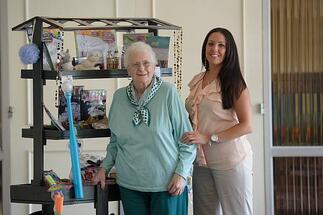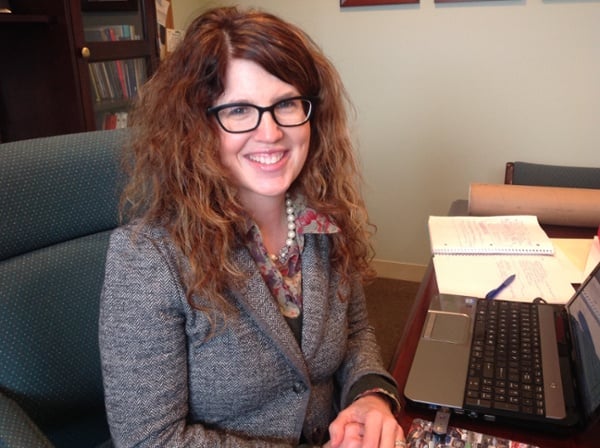 As a caregiver and child of aging parents, one of the most difficult things you must do is confront the fact that at some point you will need to have “the talk” with your loved one about their future. This is a challenging time for you and your parents as you both begin to acknowledge and discuss their diminishing abilities. Your parents are probably aware of their physical and cognitive changes and they may be anxious and reluctant to speak with you. Here are five steps to help you make sense of the changes and work with your parents to plan for the future:
As a caregiver and child of aging parents, one of the most difficult things you must do is confront the fact that at some point you will need to have “the talk” with your loved one about their future. This is a challenging time for you and your parents as you both begin to acknowledge and discuss their diminishing abilities. Your parents are probably aware of their physical and cognitive changes and they may be anxious and reluctant to speak with you. Here are five steps to help you make sense of the changes and work with your parents to plan for the future:
1. Have a Plan in Place for Anticipated Changes
You know this day is coming so don’t wait for an incident or accident to make a decision. Have a family discussion to address future healthcare needs, get the facts and explore all your options. Be sure your parents are involved in this process and don’t feel that the family is making a decision for them. With information and a plan in place, there will be less stress on everyone, especially your parents who may have great anxiety about the future.
Accepting change is a gradual process; so give your parents time to warm up to and understand their options. Be sure to discuss topics such as arranging for a power of attorney and moving into an assisted or independent living community. If you foresee resistance and additional anxiety, include a trusted health care professional in the conversation.
2. Is Your Parents’ Home User-Friendly? Evaluate for Safety
You see your aging parents struggling to make it up the stairs. You become aware of your mother’s difficulty maneuvering in the kitchen, and how restricted the space is for her walker. You begin to notice the need for bathroom rails to prevent accidents.
To minimize these stresses and work to keep your parents safe, consider two logical solutions: relocation to an assisted living facility or renovations to their home and employing a paid caregiver. The latter may take more time and investment.
3. Good Nutrition and Regular Exercise: Good Ego Boosters
For your elderly parents, good nutrition and exercise may help them to feel better physically and emotionally as they wrestle with changes to their health and self-image. Be aware that as you get older, certain healthy foods (including fiber) can become harder to digest so help your parents become educated and encourage them to eat smaller portions, lightly cook vegetables, and indulge in stews, soups and shakes. Exercising at a level comfortable for them can involve dancing, walking or even chores in and around the house.
Researchers find that older adults who exercise consistently have more grey matter which is responsible for memory, speech and information processing than their sedentary peers. They’ve also found it’s never too late to start exercising and reap the benefits so motivate your parents to keep moving!
4. Encourage Every Opportunity to Socialize
It may be difficult for your parents to accept the limitations brought on by aging and depression is not uncommon. Get them involved in their community where they can interact with others and encourage them to participate in charity events. Facilitate visits by friends for socialization. Help to arrange transportation if needed. Why not help them start a new hobby or reconnect with a interests they enjoyed in the past? Residents living at Assisted or Independent Senior Care facilities have many, many opportunities for socialization and a wide range of activities and programs to participate in to minimize loneliness.
5. Let Them Know You are There for Them
How does a child help an aging parent make the right choices? Most times it involves patience and support. It’s important for the child/caregiver to recognize that their parent may be grieving a multitude of losses; some that the children might not understand. Relationships with family and friends have a major influence on the aging parents’ mental and emotional well-being. Be sure your parents feel your love and support. Enlist the help of a trusted professional if needed and hopefully over time your parents will adjust to the changes in their life.
Key Takeaways:
- Have a family discussion regarding your parents’ health and explore all their options.
- A good diet and exercise can help boost self-esteem and mental health.
- Minimize hazardous obstacles in the home; consider remodeling and the addition of paid help in the home or moving into an assisted living facility as relevant options.
- Help your parents to beat loneliness! Get them involved in their community.
- Family plays a vital role in helping parents move through the grieving process.
Learn More
If it is time to move your loved one to an assisted living community contact United Methodist Homes to learn more about our services. We would love to further assist you!






 As a caregiver and child of aging parents, one of the most difficult things you must do is confront the fact that at some point you will need to have “the talk” with your loved one about their future. This is a challenging time for you and your parents as you both begin to acknowledge and discuss their diminishing abilities. Your parents are probably aware of their physical and cognitive changes and they may be anxious and reluctant to speak with you. Here are five steps to help you make sense of the changes and work with your parents to plan for the future:
As a caregiver and child of aging parents, one of the most difficult things you must do is confront the fact that at some point you will need to have “the talk” with your loved one about their future. This is a challenging time for you and your parents as you both begin to acknowledge and discuss their diminishing abilities. Your parents are probably aware of their physical and cognitive changes and they may be anxious and reluctant to speak with you. Here are five steps to help you make sense of the changes and work with your parents to plan for the future: